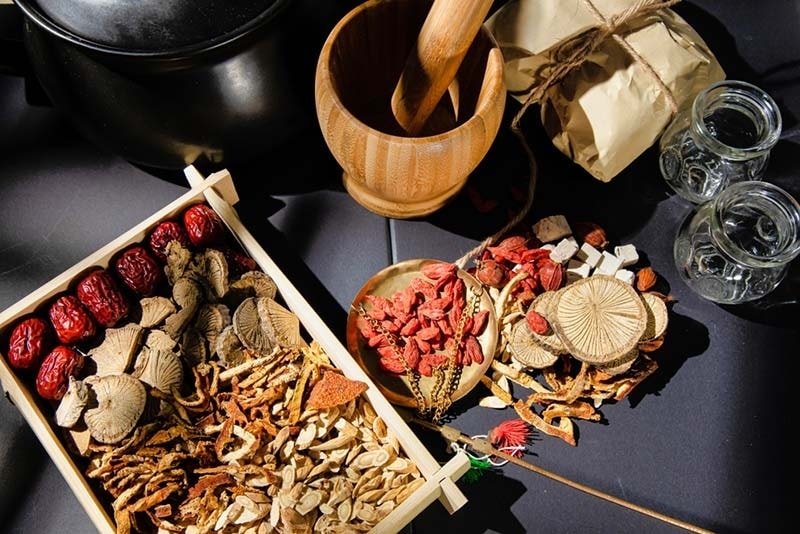Traditional remedies for insomnia using medicinal herbs.
Experts provide guidance on using traditional Chinese medicine remedies to improve insomnia and poor sleep quality.
According to Traditional Medicine Practitioner Le Xuan Hai, Chairman of the Dong Da District Traditional Medicine Association in Hanoi, insomnia is called "that mien" in Traditional Chinese Medicine. This condition can be caused by many factors such as deficiency of the heart and spleen, kidney yin deficiency, and liver qi stagnation, leading to restless, shallow sleep, which greatly affects health and quality of life.
Insomnia may seem like a simple disorder, but if it persists, it can lead to many serious consequences. People who suffer from chronic insomnia often experience impaired memory, poor concentration, and an increased risk of cardiovascular disease and stroke.
Some cases of insomnia stem from underlying medical conditions, while many others are affected by stress and psychological pressure. If left untreated, insomnia can become chronic, leading to depression, anxiety, and physical exhaustion.

To effectively treat insomnia, it's necessary to clearly identify the cause and choose the appropriate method. Below are three traditional Chinese medicine remedies that can help improve insomnia based on specific causes.
Insomnia due to stagnation of liver qi.
Symptoms: Irritability, stress, anxiety, insomnia accompanied by headaches and dizziness. The main cause is suppression of liver qi, leading to sleep disorders.
Prescription: Bupleurum chinense 12g, Mentha arvensis 8g, Atractylodes macrocephala 8g, Poria cocos 12g, Rehmannia glutinosa 12g, Glycyrrhiza glabra 6g, 3 dates, roasted ginger 1g, Pinellia ternata 12g, Citrus reticulata peel 6g, Ophiopogon japonicus 12g, Scutellaria baicalensis 8g.
Instructions: Boil with 5 bowls of water, reduce to 3 bowls, and divide into 3 doses to be taken throughout the day.
Insomnia due to deficiency of the heart and spleen
Symptoms include: prolonged insomnia, restless sleep, easily startled, forgetfulness, palpitations, poor appetite, sallow complexion, and general fatigue.
Prescription: Angelica sinensis 12g, Rehmannia glutinosa 12g, Ophiopogon japonicus 12g, Atractylodes macrocephala 16g, lotus seeds 16g, Ziziphus jujuba seeds 12g, Poria cocos 12g, cinnamon bark 4g, Codonopsis pilosula 12g, Astragalus membranaceus 12g, licorice 4g, 3 jujubes, Saussurea costus 4g, longan 12g.
Instructions: Boil with 5 bowls of water, reduce to 3 bowls, and divide into 3 doses to be taken throughout the day.
Insomnia due to kidney yin deficiency
Symptoms: Nervousness, anxiety, feeling hot, constipation, dizziness, back pain, rapid heartbeat.
Prescription: Rehmannia glutinosa 20g, Dioscorea opposita 12g, Alisma orientalis 12g, Ophiopogon japonicus 12g, Achyranthes bidentata 12g, Cornus officinalis 12g, Paeonia lactiflora 10g, Poria cocos 12g, Poria cocos 12g.
Instructions: Boil with 5 bowls of water, reduce to 3 bowls, and divide into 3 doses to be taken throughout the day. Note: Limit spicy and hot foods, and avoid cold foods.
Recommendation
In addition to medication, patients should maintain a healthy lifestyle to improve sleep, keep their minds relaxed, reduce stress, and avoid overthinking before bed.
You need to establish healthy lifestyle habits, go to bed on time, avoid strenuous exercise in the evening, and instead you can read a book, knit or crochet, or listen to relaxing music.
People need to limit stimulants, avoiding coffee, alcohol, and tobacco, especially in the evening. Avoid drinking large amounts of water before bed, and minimize waking up in the middle of the night to go to the bathroom, which can make it difficult to fall back asleep.
You shouldn't use electronic devices in bed; the blue light from phones and TVs can disrupt the production of melatonin, the hormone that regulates sleep.
Never self-medicate with sleeping pills; overuse can lead to dependence and long-term sleep disorders. If insomnia persists, patients should see a doctor to determine the cause and receive timely treatment.
Insomnia not only affects health but also reduces quality of life. Traditional Chinese medicine treatments can help improve sleep but also support bodily balance and enhance overall health.



